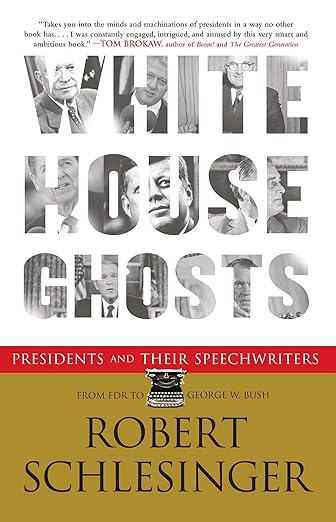White House Ghosts: Presidents and Their Speechwriters, by Robert Schlesinger.

Robert Schlesinger descends from a family steeped in history and politics. His father, Arthur M. Schlesinger Jr., was an advisor to John F. Kennedy and a renowned historian. Robert’s grandfather, Arthur M. Schlesinger Sr. was also a prominent American historian. Such a lineage may have given Robert an entrée to interview the ghosts, the behind-the-scenes ghostwriters who prepared speeches for the president, in this thoroughly researched book.
In rare cases, speechwriters actually formed policy for the administration, proving the power of the pen. Too often, as in the case of the Roosevelt and Ford presidencies, speechwriters competed against each other instead of collaborating. But in most cases, bureaucratic gatekeepers hacked to pieces the carefully crafted speeches, rendering the final draft dissimilar to the original.
Speechwriters tried to capture the speaking style of the president. Truman, who said, “Never use two words when one will do best,” used a presidential speech to fire General MacArthur. Plain-spoken Eisenhower navigated the Cold War and civil rights issues with speech which was “very direct, very un-flowered, very unornamented.” Speechwriter Ted Sorensen had rare access to the president and developed such a close understanding of JFK, Kennedy called Sorensen his “intellectual blood bank.”
Johnson rejected speeches unless they had content that would produce a news lead. Nixon instructed his speechwriters to include, “more parables, stories, anecdotes and similes”. Upon succeeding the disgraced Nixon, Ford spoke, “My fellow Americans, our long national nightmare is over,” but failed to take leadership within his own administration. Carter was precise and technical in editing his speeches, often cutting the lifeblood out of them.
Many of the exceptional speeches came to have names, such as Reagan’s Pointe du Hoc Speech on the 40th anniversary of the Normandy landings. Some speeches contained a catch phrase which took on a life of its own, as in Reagan’s Brandenburg Gate speech, “Mr. Gorbachev, tear down this wall!”
Tragedy sometimes led to memorable speeches, as when the space shuttle Challenger exploded. Reagan told the nation, “We will never forget them, nor the last time we saw them, this morning, as they prepared for their journey and waved goodbye and ‘slipped the surly bonds of earth’ to ‘touch the face of God.'”
Speechwriters attempted to characterize an administration with a phrase, such as George H. W. Bush’s “thousand points of light” and “a kinder and gentler nation”.
President Clinton, known for straying from prepared texts, reportedly wrote his own speech telling attendees of the White House Prayer Breakfast, “I have sinned”, after the Monica Lewinsky affair.
George W. Bush appeared to be a strong leader after the events of September 11, 2001, when he said, “We will not tire, we will not falter, and we will not fail.” But the book’s section on Bush turned sour as his speechwriters came under fire for using spurious information about weapons of mass destruction.
Newly elected presidents typically hired speechwriters who made valuable contributions during their campaign and selected others from the realms of academia, law, journalism, and business. Only a handful were Black or women.
The book covers speechwriters through the 43rd president. During that time, some of the better known presidential speechwriters include Welliver, Rosenman, Clifford, Sorenson, Price, Safire, Buchanan, Fallows, Noonan, Snow, Gerson, Frum, McConnell, and Scully.
There have been many others, some familiar, but the remainder are “lost to the ash heap of history”. These are the ghosts, but their words live on.
@rschles @simonschuster
#ghostwriter #speechwriter #politics #history #presidents

